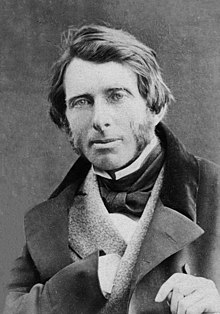John Ruskin
Appearance

John Ruskin (8 shkurt 1819 – 20 janar 1900) ishte udhëheqës dhe kritik arti anglez i perudhes viktoriane, mendimtar i shquar shoqëror dhe filantrop. Ai shkroi për tema të ndryshme si gjeologjia, arkitektura, mitet, letërsia, arsimi, botanika dhe ekonomia politike. Shkrimi dhe stilet letrare të tij ishin po aq të larmishme. Ruskin shkroi ese dhe traktate, poezi dhe ligjërata, manuale dhe letra e madje edhe një përrallë. Në të gjithë shkrimet e tij, ai theksoi lidhjet mes natyrës, artit dhe shoqërisë. Ai gjithashtu bëri skica të detajuara dhe piktura, bimë dhe zogjë, peisazhe, struktura arkitektonike dhe ornamente.[1]
Referime
[Redakto | Redakto nëpërmjet kodit]- ^ Nicholas Shrimpton:John Ruskin, English writer and artist. 3.2.2015 17.06.2016.
